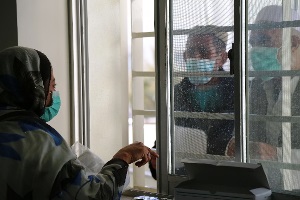 Pharmacist dispenses medicines to TB patients at a Kabul hospitalKabul, 28 March 2017 – The burden of tuberculosis (TB) is increasing in Afghanistan, with an estimated 61 000 people infected annually, causing around 12 000 deaths every year. There has been an almost 20% increase in the number of TB cases detected last year, pointing not only to the increased risk the disease poses but also to the effectiveness and improvements of Afghanistan’s health system in diagnosing, testing and detecting new cases.
Pharmacist dispenses medicines to TB patients at a Kabul hospitalKabul, 28 March 2017 – The burden of tuberculosis (TB) is increasing in Afghanistan, with an estimated 61 000 people infected annually, causing around 12 000 deaths every year. There has been an almost 20% increase in the number of TB cases detected last year, pointing not only to the increased risk the disease poses but also to the effectiveness and improvements of Afghanistan’s health system in diagnosing, testing and detecting new cases.
Out of the estimated 61 000 people who were infected with tuberculosis last year, nearly 70% were diagnosed and treated. Almost 20 000 were missed by the health system. Those most at risk for contracting tuberculosis include women and children, poor and malnourished people, refugees and internally displaced persons and the elderly. Women in Afghanistan are particularly vulnerable to the disease as they constitute two thirds of all TB patients.
Multidrug-resistant tuberculosis has emerged as a serious health challenge in Afghanistan in the past years. Drug resistance emerges when anti-TB medicines are used inappropriately, through incorrect prescription by health care providers, poor quality drugs, and patients stopping their treatment course prematurely. This type of TB cannot be treated with regular anti-TB medicines and requires a more complicated and expensive treatment course, with treatment success rate being only around 50% whereas it is almost 90% for regular TB.
“Last year it is estimated that more than 1400 people developed multidrug-resistant tuberculosis in Afghanistan although only 138 were detected and treated. This is a serious issue and we need to do much more to reverse this trend, to strengthen tuberculosis screening and testing, treatment and follow-up,” said Dr Richard Peeperkorn, WHO Country Representative, speaking at a World Tuberculosis Day event held in Kabul.
“Given that tuberculosis is a completely preventable and curable disease, it is unacceptable that still over 30 Afghans die of this disease every day. With the support of the Government of Japan, WHO is supplying anti-TB medicines and laboratory consumables to health facilities across the country and we are continuously training health staff to effectively diagnose and treat TB patients,” said Dr Peeperkorn.
“Nobody should be left behind in the fight against TB. We need to accelerate progress towards zero TB deaths, infections, suffering and stigma.”



